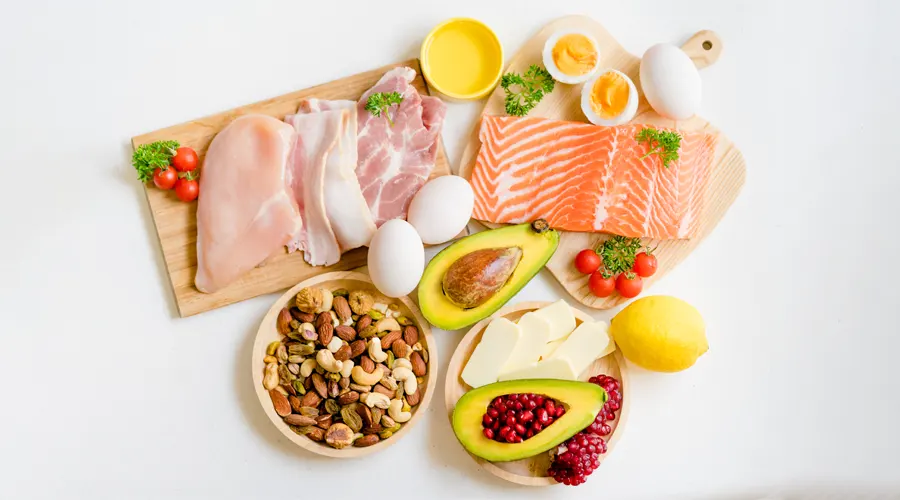Depression is a serious mental health condition that affects millions of people worldwide. It can cause persistent feelings of sadness, loss of interest in activities, and various physical and emotional problems. The impact of depression can be devastating, not only for those who suffer from it, but also for their families and loved ones. It’s essential to understand that depression is more than just feeling down; it can affect one’s ability to function daily and can lead to severe consequences if not addressed. Recognizing the signs of depression and depression symptoms early can be crucial in managing the condition effectively.
One important aspect of managing depression and anxiety is diet. The food we eat plays a significant role in our mental and physical health. While there is no specific diet that can cure depression, certain foods can help alleviate symptoms and support overall well-being. By incorporating the right nutrients into our diet, we can improve our mood, increase energy levels, and enhance our mental health. Understanding the link between food and mood is crucial for anyone dealing with depression and looking to manage their symptoms more effectively.
Signs of Severe Depression
Severe depression, also known as major depressive disorder (MDD), stretches far beyond simple feelings of temporary sadness or gloom. This serious condition creates deep ripples through every aspect of daily living and personal connections. Learning to spot signs of severe depression opens the door to proper care and healing. Below are common signs that may indicate severe depression:
Importance of recognizing the signs early
Quick recognition of signs of depression’s severe symptoms helps prevent deeper struggles with mental and physical health. Early awareness empowers people to reach out for professional guidance and vital support networks.
Emotional Signs
- Persistent Sadness or Hopelessness: One of the main signs of severe depression is the presence of pervasive dysphoria, or persistent feelings of sadness or hopelessness that will not abate no matter the nature of the present circumstances.
- Feelings of Worthlessness or Excessive Guilt: People can constantly give themselves excessive amounts of blame and humiliation over trivial circumstances or events that have little to do with self-esteem.
Behavioral Signs
- Withdrawal from Social Activities: To get to know its symptoms, people with severe depression tend to distance themselves from others they know, loved ones, and any social events.
- Lack of Interest in Hobbies or Enjoyable Activities: Loss of pleasure in activities previously found enjoyable is a major criterion that is noticeable.
Physical Signs
- Changes in Sleep Patterns: Sleep disturbances such as; insomnia or hypersomnia are some of the physical signs of severe depression.
- Appetite Changes: This could present in the form of food refusal accompanied by loss of weight or increased food intake resulting in an increase in weight.
- Unexplained Physical Symptoms: The majority may present with complaints of generalized aches, pain, or chronic fatigue that cannot be medically explained.
Cognitive Signs
- Difficulty Concentrating or Making Decisions: Severe depression can impair cognitive functions, making even small decisions feel overwhelming.
- Memory Issues and Slowed Thinking: Forgetfulness and a feeling of mental fog can be distressing and interfere with daily tasks.
Serious Warning Signs
- Thoughts of Death or Suicide: Ideas of death, suicidal or nonsuicidal, are one of the worst signs of severe depression that requires immediate intervention.
- Increased Irritability or Agitation: Low energy is common in depression but some people can turn aggressive and remain restless most of the time.
When to Seek Help
If you or someone you know is experiencing these signs of severe depression, it’s essential to seek professional help. Severe depression is treatable with a combination of therapy, medication, and lifestyle changes. Contact a trusted healthcare provider or mental health professional.
Resources for Immediate Support
- Crisis Hotlines: Many countries offer 24/7 hotlines for immediate assistance.
- Mental Health Services: Seek a local mental health clinic or counselor for professional evaluation and treatment.
Takeaway
Recognizing and addressing the signs of severe depression is a vital step toward recovery. Remember, prioritizing mental health is an act of strength. Seeking support, whether through friends, family, or professionals, can pave the way to a healthier, more fulfilling life.
Understanding the Link Between Food and Mood
Nutrition has a profound effect on mental health. Our brains rely on the nutrients we consume to function correctly. Just as our bodies need vitamins for memory and focus and minerals to stay healthy, our brains need specific nutrients to maintain mental well-being. When we eat a balanced diet rich in essential nutrients, we provide our brains with the tools they need to produce neurotransmitters, which are chemicals that help regulate mood and behavior. This can be particularly important for those feeling depressed and experiencing symptoms of anxiety and depression.
Key nutrients play a vital role in mental well-being. These include omega-3 fatty acids, antioxidants, B vitamins, and minerals like magnesium and zinc. Each of these nutrients has a specific function that supports brain health. For example, omega-3 fatty acids help build brain cells, while antioxidants protect the brain from damage caused by free radicals. By understanding which nutrients are essential for mental health, we can make better food choices that support our overall well-being and help alleviate the signs of severe depression. Additionally, incorporating a supplement for brain health can ensure we receive adequate amounts of these vital nutrients, further enhancing mental health and cognitive function.
Ready To Boost Your Mood? Explore These Depression-Fighting Foods!
Top Foods to Fight Depression
Omega-3 Rich Foods
Benefits of Omega-3 Fatty Acids Omega-3 fatty acids are crucial for brain health. They help reduce inflammation, which can affect mood and behavior. Omega-3s also support the production of neurotransmitters, improving communication between brain cells.
Best Sources: Fatty Fish, Flaxseeds, and Walnuts Fatty fish like salmon, mackerel, and sardines are excellent sources of omega-3s. If you don’t eat fish, flaxseeds and walnuts are great plant-based alternatives.
Antioxidant-Rich Fruits and Vegetables
Role of Antioxidants in Reducing Inflammation Antioxidants help reduce inflammation and oxidative stress in the brain, which can contribute to depression. By neutralizing free radicals, antioxidants protect brain cells from damage.
Best Sources: Berries, Spinach, and Broccoli Berries like blueberries and strawberries are rich in antioxidants. Spinach and broccoli are also packed with these beneficial compounds, making them great additions to your diet.
 food for fighting depression
food for fighting depressionWhole Grains
Benefits of Complex Carbohydrates Whole grains provide complex carbohydrates, which are essential for maintaining stable blood sugar levels. Stable blood sugar helps keep your mood balanced throughout the day.
Best Sources: Oats, Quinoa, Brown Rice Oats, quinoa, and brown rice are excellent sources of whole grains. These foods provide a steady release of energy and help keep you feeling full and satisfied.
Fermented Foods
Importance of Gut Health for Mental Well-being Fermented foods support gut health by providing beneficial bacteria, which can influence mood and mental health. A healthy gut can reduce symptoms of depression and anxiety.
Best Sources: Yogurt, Kefir, Sauerkraut Yogurt, kefir, and sauerkraut are rich in probiotics, which promote a healthy gut. Including these foods in your diet can help improve your mental well-being.
Lean Proteins
Role of Amino Acids in Neurotransmitter Production Amino acids, the building blocks of protein, are essential for producing neurotransmitters like serotonin and dopamine, which regulate mood and behavior.
Best Sources: Chicken, Turkey, Beans Chicken, turkey, and beans are excellent sources of lean protein. These foods provide the amino acids needed to support brain health.
 food for fighting depression
food for fighting depressionNuts and Seeds
Benefits of Healthy Fats and Magnesium Nuts and seeds are rich in healthy fats and magnesium, both of which support brain function. Magnesium, in particular, has been shown to help alleviate symptoms of depression.
Best Sources: Almonds, Chia Seeds, Sunflower Seeds Almonds, chia seeds, and sunflower seeds are great sources of these nutrients. Including a variety of nuts and seeds in your diet can benefit your mental health.
Dark Chocolate
How Dark Chocolate Boosts Mood? Dark chocolate contains compounds that can boost mood and improve brain function. It stimulates the production of endorphins, which are chemicals in the brain that create feelings of pleasure.
Recommended Amount and Types – A small piece of dark chocolate, preferably with a high cocoa content, can be a healthy treat. It’s best to choose dark chocolate with at least 70% cocoa for the most benefits.
Green Tea
The Role of L-Theanine and Antioxidants – Green tea contains L-theanine, an amino acid that promotes relaxation and reduces stress. It also has antioxidants that support brain health.
Benefits of Regular Consumption – Drinking green tea regularly can help improve mood and reduce symptoms of depression. Aim for a few cups a day to enjoy its benefits.
Take Control Of Your Mood With The Right Diet – Find Out How!
Foods to Avoid for Better Mental Health
High Sugar Foods
This paper revealed that foods enriched with sugar influence the feelings of a human being. Excessive consumption of sugars leads to changes in blood sugar levels making you moody, fatigued, and easily irritated. These changes can make depressive effects worse in particular if they are already present in a patient. Some of the examples of foods rich in sugars include Candies, Patisseries, juices and soft drinks, and many packaged snacks. One should pay attention to sugar which is often added in small portions to foods such as yogurts, sauces, and cereals.
Processed and Junk Foods
Most processed and junk foods are rich in unhealthy fats, additives, and preservatives which are unhealthy for your brain. These are usually associated with a lack of several nutrients requisite for the sustenance of a healthy brain. Consumption of food that is processed has been associated with high risks of depression and anxiety. Examples are fast foods, chips, processed meat products, and packaged snacks. Selecting whole, unprocessed foods can go a long way in establishing energy levels and moods during the day.
 food to avoid for mental health
food to avoid for mental healthCaffeine and Alcohol
They may also give you a quick shot of positive emotions translating to a better mood, but have long-term impacts on mental health. Caffeine stimulates anxiety, disrupts sleep, and leads to jitters that worsen depression. Alcohol, being a depressant, slows down brain function and hence, heightens the feelings of depression. Both substances can entice properly with antidepressant medicines. Hence, they should be taken sparingly or ignored if citizens want to have better mental health.
Jessica Plonchak, Executive Clinical Director at ChoicePoint
“Alcohol addiction impairs cognitive abilities by damaging brain structures and functions. It leads to memory loss, reduced attention span, impaired judgment, and difficulty in learning. Constant use can increase the risk of mental health disorders, such as depression and anxiety, and neurodegenerative diseases like dementia and Alzheimer’s. These substances also impair brain plasticity. With time the person may even begin to have difficulty in solving everyday problems wisely. It can also cause long-term decline and increase the risk of developing conditions like dementia and Wernicke-Korsakoff syndrome.”
Creating a Balanced Diet Plan
Include a Variety of Nutrient-Rich Foods: Aim for a balanced diet with diverse nutrient sources.
Add More Fruits and Vegetables: Use fresh, frozen, or canned options that are low in added sugars and sodium.
Opt for Whole Grains: Choose brown rice, quinoa, and oats over refined grains like white rice and white bread.
Lean Proteins are Essential: Incorporate chicken, turkey, fish, beans, and legumes to maintain stable energy levels and mood.
Incorporate Healthy Fats: Use sources like nuts, seeds, avocados, and olive oil for healthy fats.
Plan Meals: Preparing meals and healthy snacks in advance can help you stick to your diet plan.
Additional Tips for Managing Depression with Diet
Importance of Regular Meals and Snacks
Regular meals and snacks stabilize the fluctuation of blood glucose levels which contributes to better moods and energy levels. Not eating results in low blood sugar levels which makes a person feel weak and moody. Ideally, consume three meals with a balanced distribution of nutrients throughout the day and 2-3 hunks. This routine makes sure that your brain gets a constant source of nutrients that help soothe it and stabilize its functionality.
Staying Hydrated
It is important not only for the body’s health but for the mind also: drinking water is the best thing that can be done. This condition results in unconsciousness and confusion, irritability, and an exacerbation of the patient’s depression. Ideally, one should try to have at least eight servings of water each day. You can also maintain your fluid intake by consuming dietary water sources such as fruits and vegetables.
 staying hydrated for mental health
staying hydrated for mental healthConsulting with a Nutritionist or Dietitian
While caffeine and alcohol can temporarily boost your mood, they can also lead to long-term negative effects on mental health. Caffeine can increase anxiety, disrupt sleep patterns, and cause jitteriness, which can worsen depression symptoms. Alcohol, being a depressant, can lower brain activity and make depressive symptoms more intense. Both substances can interfere with the effectiveness of antidepressant medications. It’s best to consume them in moderation or avoid them altogether for better mental health.
FAQs
Can diet alone cure depression?
Although diet cannot reverse depression, it can help a lot in controlling its effects. Depression is a severe mental disorder that, sometimes only requires both, therapy and medicine. Despite this, a balanced diet that includes all the necessary nutrients can help maintain good mental health. Fish, nuts, beans, and vegetables such as spinach are some foods that are nutritionally rich to support the brain. But it must be remembered of course that diet can affect mood and energy, so a visit to a healthcare provider is recommended for a regimen.
How long does it take to see improvements in mood with dietary changes?
The duration that may be required to observe enhanced mood about dietary control can also take some time and may not be the same in all individuals. The effects in some persons may start manifesting in a few weeks, while those of others may take up to a few months. Replacing unhealthy foods with fruits, vegetables, whole grains, lean meats, and healthy fats will slowly begin to make changes that reflect on an increase in good moods and more energy. Continuity is sacrosanct, but integrating the change in diets with other wholesome practices such as exercise and sleep can multiply the gain.
Are there any risks associated with changing my diet for mental health?
The transition to a new eating plan is good for the brain, but it needs to be done properly. Fluxes and extreme or abrupt changes may at times cause peculiar nutrient deficiencies in the body or sometimes digestive complications. It is wise to introduce changes gradually and perhaps aim at moderation across the foods we eat. If you wish to make these changes to your diet, it might be wise to seek advice from your doctor or a nutritionist first. They can also give us suggestions depending on our health needs with much ease.
Conclusion
Summing it all, therefore it appreciates one’s health especially the mental one depending on the diet that is taken. Some foods like green vegetables and fish Omega-3 fatty acids, nuts, seeds lean protein and whole grains foods are useful in warding off depression. Exclusion of high sugar diets, processed and junk foods, caffeine, and alcohol are also effective ways of promoting good mental health.
Modifications in eating habits can be a strong exercise towards ensuring that one controls or treats depression. Using nutrient-dense foods and removing or moderating foods that have the potential to worsen your mood can boost your mental health. Always drink water, take meals and snacks, and consult a medical professional if feeling unwell. Large changes in diet are not nearly as effective in improving one’s health as subtle changes made to one’s diet consistently.



